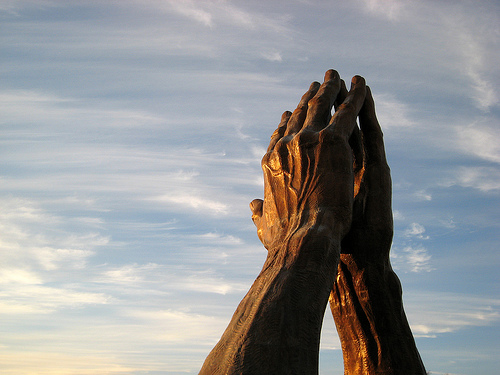The things we carry with us — our race, our education, our gender, our families, our age, our masks, our broken pieces, our patterns, perhaps particularly our prayers — stick with us, and though they can be wearisome, they tell us who we are. For many of us Mainlines, prayer reveals much about us because it is not something that comes naturally to us. We either learn the formal, ritualized prayers of our hymnals or the earnest, enthusiastic prayers from our time at camp and youth group. In my own family, if someone is asked to pray spontaneously, a wide-eyed look of unease comes over the person like they have a bad case of gas.
I’m sure the average lay-person believes that every pastor lives a life of prayer when we all know that varies. For some of us, we pray publicly because it’s a part of our job. Some of us don’t mind it and others of us mind it a whole lot. Yet every time someone says “Pastor, will you pray?” I feel a bit of horror circle in the base of my stomach and I’m afraid I will be exposed as a fraud; no one could possibly believe I’ve been at this job as long as I have because I’m so inadequate at praying out loud. Yet, many faint-of-heart pastors will tell you that they spend a great deal of time praying as they sit down to write a sermon and remembering those in their congregation.
How does personal prayer influence our lives as pastors and preachers? An overly simplistic outlining would tell you many of us pray out loud to gather tendrils of thought (or people), remind the community or the challenges, losses, and hopes that lay before it, or perhaps to even convince others of a certain religious or political agenda. In other words, praying out loud feels like an act of leadership on behalf of the community but it seldom changes my inner life as a leader.
However, when we pray in silence it is often about ourselves, although this is no selfish endeavor. Rather, when we pray when we are alone we are in a sense asking that we be changed. That we learn to view the world differently. That Christ and his Spirit would work in us so that we might notice that the Father’s love is the last word in this world and that all things fall under and into this love.
Prayer before a sermon reminds us that the preaching moment is not about us but about God and what God is doing in our simple words. Community prayer can do some of this as well but private prayer reminds us that life itself is sacramental and each moment is bathed in God’s promises made to us in real flesh, in Christ. Praying alone allows us to become captivated by the everyday, and this alone can affect our preaching.
The bottom line is that Christ loves to hear from us. He first asked us to pray and then taught us how. He who was there at the first star also learned to hold his hope lightly for us because too often we forget how much he loves to hear about our lives. We forget that all our fears, all our selfishness, all that we carry with us, is taken into Christ’s promise where it has already been redeemed, made whole. Prayer helps ground us in that promise.
And for those us who preach, those of us who fear we and our words might not be enough, Christ reminds us they are. In the end, as it was in the beginning, it is not about us, rather it is all for us.
